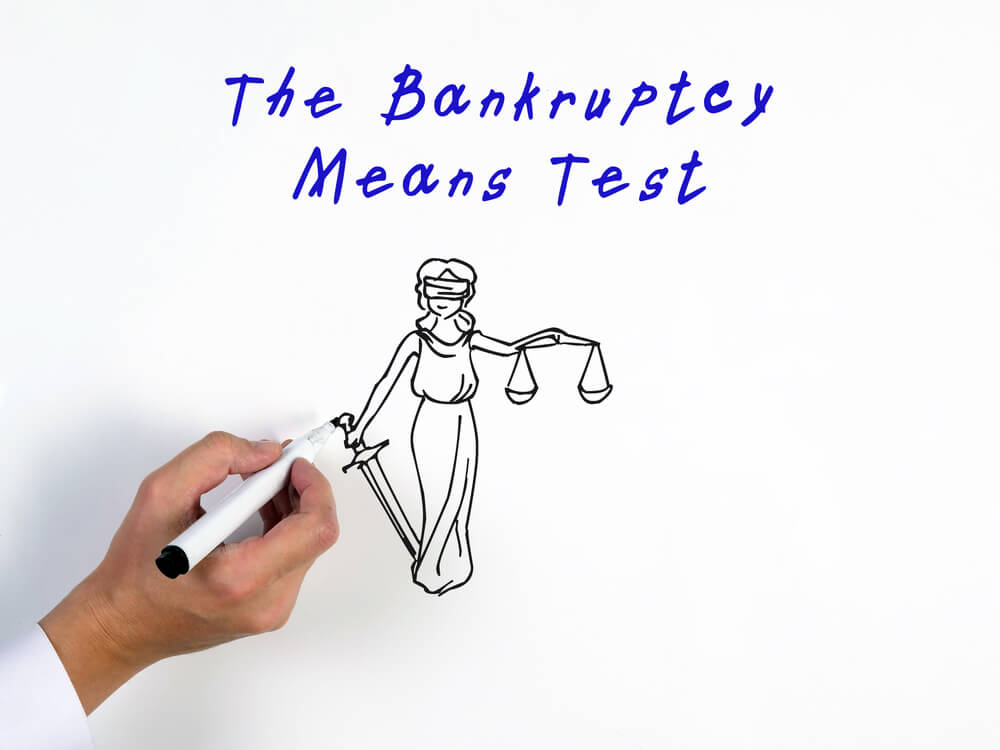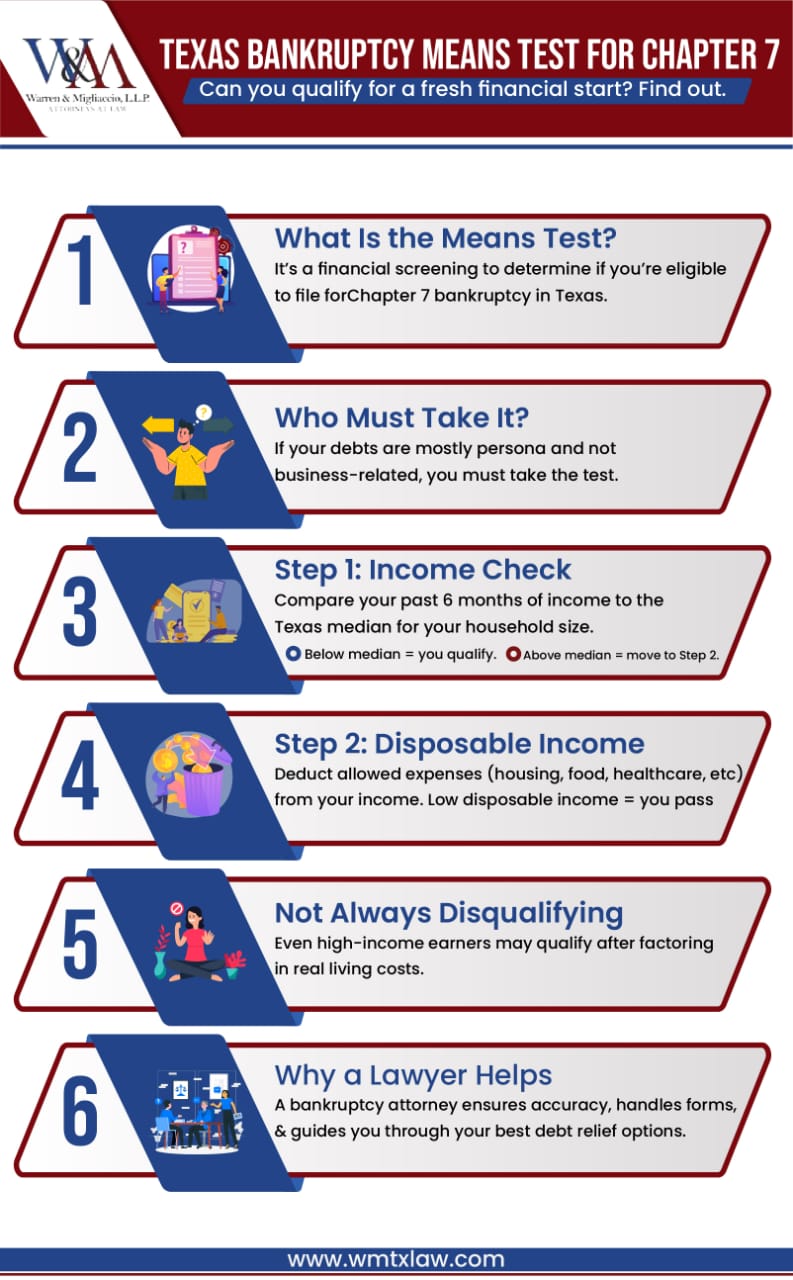
When your debt becomes unmanageable, you may have legal options like Chapter 7 bankruptcy to get a fresh financial start. But before you file, you must qualify. Our Texas bankruptcy lawyers explain the Texas bankruptcy means test, which decides if you can file for Chapter 7.
If you are thinking about filing for bankruptcy in Texas, contact our law office today. At Warren & Migliaccio, we have helped many people through the bankruptcy process. When financial hardship threatens you and your family, we can help you take control. Contact us online to get started.
Chapter 7 Case Filings: A National Snapshot
To understand why the Chapter 7 means test is so important, it helps to know how many people use this type of bankruptcy.
In the United States, there were 261,277 Chapter 7 bankruptcy filings in the 12 months ending December 31, 2023. Source: United States Courts.
This large number shows why the Texas bankruptcy means test matters. It decides who can file for Chapter 7 in Texas. Many Texans rely on this test to get a fresh financial start.
What is Bankruptcy
Bankruptcy is a legal process that helps individuals or businesses get relief from debts. In Texas, the bankruptcy means test is a key step to see if you qualify for Chapter 7 bankruptcy or if you must file for Chapter 13 instead.
The means test looks at your average monthly income and disposable income to figure out if you can pay your debts.
To qualify for Chapter 7 bankruptcy, your income must be below the Texas median income for your household size. If your income is above the median, you may still qualify if your disposable income is low enough.
How the “Means Test” Affects Filing for Bankruptcy in Texas
There are two main types of personal bankruptcy in Texas: Chapter 7 and Chapter 13. Each has its own qualifications, benefits, and drawbacks. The main purpose of the means test is to decide if you can file for Chapter 7 bankruptcy or if you must file for Chapter 13 instead.
The means test was created by the Bankruptcy Abuse Prevention and Consumer Protection Act of 2005. This law helps prevent higher-income people from abusing the bankruptcy system.
In simple terms, the means test checks if you truly can’t pay your debts. If you pass the means test, you can file for Chapter 7. If not, you may have to file for Chapter 13, which is a repayment plan.
Chapter 7 bankruptcy is a liquidation bankruptcy. Under Chapter 7, any non-exempt assets are sold to pay off as much debt as possible. Then, most unsecured debt—like credit card debt, medical debt, and personal loans—is discharged. However, to qualify for Chapter 7 bankruptcy, filers must prove they cannot repay their debts by passing the means test.
Chapter 13 bankruptcy is a reorganization bankruptcy. Under Chapter 13, you reorganize your debts and set up a manageable payment plan to pay them off over three to five years. After the payment period, any remaining unsecured debt can be discharged. A Chapter 13 bankruptcy in Texas is often called a wage earner’s plan because it involves some debt repayment. You can learn more about the difference between Chapter 7 and Chapter 13 bankruptcy on our blog.
What Is the Chapter 7 Means Test?
The Texas means test decides if you can file for Chapter 7 bankruptcy. It checks whether you truly cannot pay your debts or if you have enough income to repay some or all of them through a repayment plan.
This test only applies to higher-income filers. If your income is below a certain level, you do not have to take it. The goal is to keep Chapter 7 bankruptcy for people who genuinely can’t repay unsecured personal loans and other unsecured debts.
Accurate income and expense information is very important. The means test limits who can file Chapter 7 by looking at your disposable income and allowable deductible expenses.
Congress created the means test to stop people who can pay back their debts from using Chapter 7. This helps protect creditors and keeps the system fair.

How the Bankruptcy Means Test Works in Texas
You will not need to take the means test if you are filing for bankruptcy with your business. If you are considering personal bankruptcy, you must pass the means test based on your annual income or disposable income.
One exception is if most of your debt (over 50%) is business debt—sometimes called non-consumer debt. In that specific situation, you may not need to complete the means test at all.
We recommend working with an experienced Texas bankruptcy attorney to help you with the means test. An attorney can check if you pass the test and explain how deductible expenses affect your means test calculation.
Median Income Comparison
The first part of the Texas means test for Chapter 7 is comparing your income to the median. You start by calculating your annual income based on your average household income. You do this by finding your monthly average over the last six months.
For the means test, “income” includes more than just your gross wages, salary, tips, bonuses, overtime, and commissions. You must include all sources of income in the means test calculation, such as:
- Spouse’s gross income
- Alimony and maintenance payments
- Child support payments
- Regular contributions from any source to household expenses, such as from an unmarried partner, family members, dependents, or roommates
- Net income from operating a profession, farm, or business income
- Rental income from rental property or other real property
- Interests, dividends, and royalties
- Certain unemployment income
- Certain pension or retirement income
- DOES NOT INCLUDE Social Security retirement benefits and Social Security disability insurance
Then, you must decide if your annual income is higher or lower than the median family income for a household of your size in Texas. The United States Department of Justice publishes updated data from the Census Bureau showing the median household income for each state. You calculate your total income for the past six months, then pro rate it for a year. For example, if you earned $27,000 in six months, that equals $54,000 per year.
If, based on your household size, your income is below the median in Texas, you do not need to do anything else for the means test. You automatically qualify for Chapter 7 bankruptcy relief.
But what if your income is above the median for your household size in Texas? You are not automatically disqualified. Instead, you must move on to the next step of the means test to see if you still qualify.

Disposable Income Analysis
The means test does not just focus on your family income. Even if you are above the median, you might still qualify for Chapter 7 if your expenses are high compared to your current monthly income.
This second part of the test calculates your disposable income after subtracting certain allowable monthly expenses from your monthly income. To qualify for Chapter 7 bankruptcy, you must show you do not have enough disposable income to pay your debts.
You will base this on the allowed monthly expenses. For example, the Internal Revenue Service (IRS) has national and local standard amounts for certain basic living costs, and local standards vary by county.
The IRS allows many types of basic living expenses, including (but not limited to):
- Food
- Housekeeping supplies
- Apparel (this living expense includes clothing)
- Personal care products and services
- Out-of-pocket healthcare costs
- Housing and utility costs
- Transportation costs
- Taxes
- Life insurance
- Health insurance
The Means Test will also consider debts such as:
- Secured Debt
- Child Support Obligations
- Spousal Maintenance Obligations
- Child Day Care Expenses
- Charitable Donations that you have historically made.
After subtracting these costs, the amount left is your disposable income. If your disposable income for the next 60 months is less than $7,475, you pass the means test.
If it turns out you have enough disposable income to pay part of your debts, you cannot file for Chapter 7. Instead, you may file for Chapter 13 or look into alternative debt resolution options. If you fail the bankruptcy means test, Chapter 13 might still be an option.
From the Desk of Chris Migliaccio: When Income Isn’t the Whole Story
I’ve often met families in Texas who are worried about the means test. They think their income is too high for Chapter 7 bankruptcy just because they earn more than the median.
I remember one couple, both teachers with two kids. At first, their pay stubs showed income above the Texas median income limit. They thought they wouldn’t qualify.
But then, we listed all their real, necessary monthly costs. These included:
- Mortgage payments
- Car payments
- Health insurance premiums
- Childcare expenses, which were quite high
After we accounted for all these allowable deductible expenses under the means test rules, their disposable income was actually low.
This meant they did qualify for Chapter 7 bankruptcy. It gave them the fresh start they needed.
This example shows why it is important to look at the full financial picture, not just your gross income.
Case Study: Navigating the Means Test with a Non-Filing Spouse in Texas
A real-world example of how Texas courts handle means test complexities is the case In re Loya, 473 B.R. 93 (Bankr. S.D. Tex. 2012). Mrs. Loya filed for Chapter 7 bankruptcy on her own, while her husband did not file. A creditor argued that including Mr. Loya’s income would make Mrs. Loya fail the means test. This would create a presumption of abuse.
The court carefully looked at the couple’s combined income and their actual household expenses. The court focused on how to divide shared debts, like their mortgage, for which both were responsible.
After adjusting for the non-filing spouse’s share of income used for his separate debts, and considering the actual necessary household expenses, the court found Mrs. Loya did not have enough disposable income to trigger the presumption of abuse.
Because of this, the creditor’s request to dismiss Mrs. Loya’s Chapter 7 bankruptcy case was denied.
This case is important because it shows how Texas bankruptcy jurisdictions assess the means test for married couples when only one spouse files. The courts look at the real financial situation and shared obligations. They do not just use a simple income calculation.
Role of a Bankruptcy Attorney
A bankruptcy attorney plays a vital role in helping you through the bankruptcy process. They can figure out which type of bankruptcy is best for your situation, help you with all the required forms, and represent you in court.
They also guide you through the means test by calculating your average monthly income, disposable income, and allowable expenses to see if you qualify for Chapter 7 bankruptcy. A bankruptcy attorney can show you other debt relief options—like debt settlement or debt management programs—if you do not qualify for Chapter 7.

Debt Management Alternatives
If you do not qualify for Chapter 7 bankruptcy, you still have other ways to manage your debt. Debt settlement involves negotiating with creditors to reduce what you owe. Debt management programs work with a credit counseling agency to create a repayment plan.
While these programs can help, be cautious if you use a debt settlement company. Some may charge high fees or use questionable methods. A bankruptcy attorney can help you decide which option is best for your situation.
Completing Bankruptcy Forms
To file for bankruptcy, you must complete various forms, including the bankruptcy petition, schedules, and statement of financial affairs. If you file for Chapter 7 bankruptcy, you also need the means test form, which calculates your average monthly income, disposable income, and allowable expenses.
A bankruptcy attorney can help you fill out these forms correctly. They can also help you gather important documents, like pay stubs, bank statements, and tax returns, to support your bankruptcy filing.
Texas Bankruptcy Means Test: FAQs
What is the Texas bankruptcy means test and how does it work?
Part 1: Income Comparison
1. Your average monthly income over the past six months is calculated and compared to the Texas median income for your household size.
2. If your income is below the median, you automatically qualify for Chapter 7.
3. Social Security retirement and disability benefits are excluded from this calculation.
Part 2: Disposable Income Analysis (only required if your income is above the median)
1. This calculation subtracts allowed expenses from your income to find your disposable income.
2. The test uses both IRS standard allowances and your actual necessary expenses.
3. If your disposable income over 60 months is too low to pay a large share of your unsecured debts, you may still qualify for Chapter 7.
4. If your disposable income is between $138.83 and $231.67 per month, multiply it by 60 to see if you qualify for Chapter 7.
What income qualifies for Chapter 7 bankruptcy in Texas?
1. $60,040 for one person
2. $77,611 for two people
3. $87,228 for three people
4. $101,753 for four people
If your income is above these amounts, you are not automatically disqualified; you just have to complete the full means test to see if you qualify based on disposable income.
What expenses are allowed as deductions on the bankruptcy means test?
Basic living expenses (IRS national standards):
1. Food, housekeeping supplies, clothing, and personal care products
2. Out-of-pocket healthcare costs up to certain limits
3. Accurately determining actual expenses is crucial for allowable deductions in the means test, so you include all mandatory and exceptional expenses (like child support or healthcare costs).
Location-specific expenses (local standards):
1. Housing and utility costs for your county
2. Transportation expenses, including car payments, insurance, and operating costs
Other necessary expenses:
1. Tax obligations
2. Health and life insurance premiums
3. Child support and alimony payments
4. Childcare expenses
5. Regular charitable contributions (with established history)
6. Secured debt payments for necessary property
Are there exemptions from taking the means test?
Business debt exemption: If more than 50% of your total debts are non-consumer (business) debts, you generally do not need to complete the means test
Disabled veterans exemption: Veterans whose debts were mostly incurred during active duty or while performing homeland defense activity may be exempt
Military members: Active duty military personnel serving more than 90 days may qualify for special consideration
These exemptions allow qualified individuals to file for Chapter 7 bankruptcy regardless of their income. Also, Texas bankruptcy courts may have specific rules about how to count household size, so dependents and living arrangements can matter.
Does Social Security income count in the bankruptcy means test?
1. The Social Security Act keeps these benefits from being counted as income.
2. This applies even if those benefits are in your regular bank account.
3. Supplemental Security Income (SSI) is also excluded.
4. Other retirement income, like pensions or 401(k) distributions, usually is counted.
5. This exclusion can greatly increase your chances of qualifying for Chapter 7.
Additionally, involuntary payroll deductions like taxes and court-ordered payments are left out of the means test calculation.
Can I still qualify for Chapter 7 if my income is above the median?
1. If your income is above the median, you must complete the full means test calculation.
2. The test subtracts allowed expenses from your current monthly income.
3. If your disposable income over 60 months is less than about $139 per month, you can still file for Chapter 7.
4. Even if your disposable income is higher, you might qualify if it is not enough to pay at least 25% of your unsecured debts over five years.
Calculating disposable income compared to the median bankruptcy income levels is key. If your income is above median, it is especially wise to work with a bankruptcy attorney so all allowed expenses are included.
What happens if I don’t pass the means test in Texas?
1. Chapter 13 bankruptcy: You create a 3–5 year repayment plan based on what you can afford. Remaining unsecured debts may be discharged after you finish.
2. Debt settlement or management plans: You work with creditors to reduce or better manage what you owe outside of bankruptcy.
3. Re-evaluate later: Your finances may change, which could let you pass the means test in the future.
4. Special circumstances: Courts may adjust the means test if you have extraordinary medical expenses, military deployment, or a recent job loss.
5. Consult with an attorney: A bankruptcy lawyer can review your means test calculation and advise on next steps with a free consultation.
A debt management program involves negotiating lower interest rates and creating a structured payment plan.

Schedule a Consultation With Our Texas Bankruptcy Lawyers
Even if you qualify for Chapter 7 bankruptcy, it may not always be the best move. Your best options depend on your unique financial situation. We suggest talking to an experienced bankruptcy attorney from our law firm about your case.
During a consultation, we can answer your bankruptcy law questions, discuss your situation, and explore your potential legal options. Our legal advice can help you make informed choices about your financial future. Contacting a local bankruptcy attorney can give you personalized guidance and a free evaluation. Contact us online or call our office at (888) 584-9614 to schedule your free consultation today.
Disclaimer: This article is for informational purposes only and does not constitute legal advice. For advice about your specific situation, please consult a qualified bankruptcy attorney in Texas.
